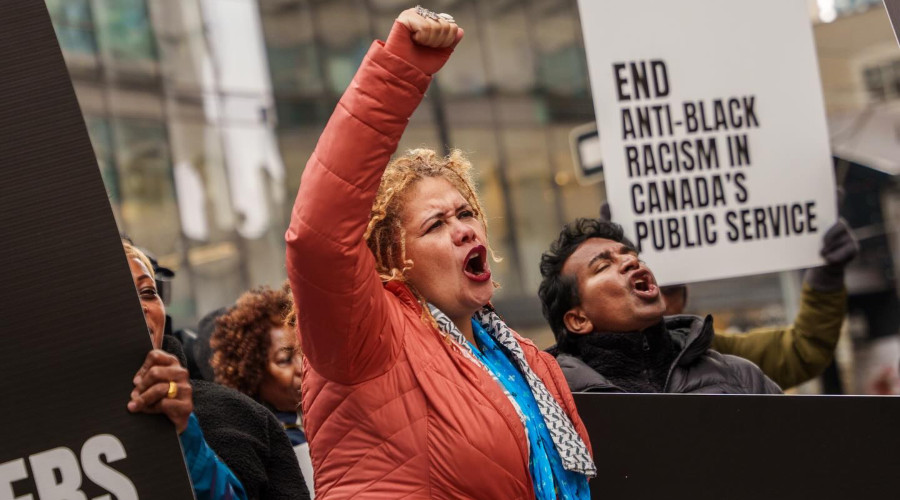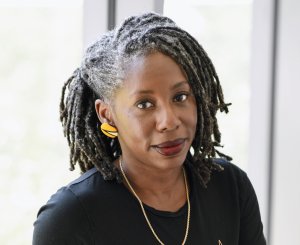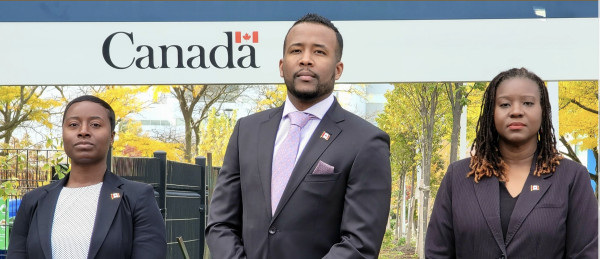There were protests, debates and discussions, and politicians talking about anti-Black racism. Some Canadian politicians like Premiers François Legault and Doug Ford refused to acknowledge systemic anti-Black racism in the country.
Prime Minister Justin Trudeau disagreed.
On June 2, 2020, in the House of Commons, Trudeau said, “Anti-Black racism is real. Unconscious bias is real. Systemic discrimination is real. For millions of Canadians, it is their daily, lived reality. The pain and damage it causes is real, too. Mr. Speaker, every Canadian who has felt the weight of oppression, every student who has the courage to demand a better future, every person who marches and posts and reads and fights from Vancouver to Montréal to Halifax expects more than the status quo. They expect more and deserve better. The Government of Canada has a lot of work to do, but we are ready. We are ready to work with our opposition colleagues, community leaders, and Canadians to make our country fairer and more equal. Racism never has a place in our society. And we will do everything we can to eradicate it from coast to coast.”
Politicians will deliver speeches, throw money around, or even take a knee, but what are they really willing to do?
Most times, nothing concrete or sustainable because that would mean acknowledging wrongdoing and giving up power. Since when do oppressors choose to give up powers to those they oppress?
{https://www.instagram.com/p/DCXUsK3O_l6/?img_index=1}
Look no further than the historical and current systemic anti-Black racism in Canada’s own federal public service. The Black Class Action Secretariat (BCAS) was created in 2020 to highlight the persistent exclusion and lack of opportunities for Black employees in the federal government.
Spearheaded by Nicholas Marcus Thompson, a union leader and public servant, the BCAS raised concerns about anti-Black racism within the federal public service with the Commissioner of the Canada Revenue Agency and the Clerk of the Privy Council.
{https://www.instagram.com/p/DDiDHV2tWUa/}
No one listened.
“It was like the employer was using the same playbook, same tools in every department, qualified or highly qualified Black people, starting their careers, getting in where they can, remaining in those positions for their entire careers, being good enough to train others, being good enough to temporarily act, never good enough to be promoted beyond one level, maybe,” Thompson explained. “And the disproportionate impact on Black women, that was what we found throughout the public service.”
{https://www.instagram.com/p/DCNVqKasHeI/}
In November 2024, CBC obtained an internal government-funded report on workplace anti-Black racism and harassment in the federal public service. "Black women detailed workplace conflicts so severe that they led to chronic depression, the use of antidepressant medications, and suicide attempts," the report stated. The report, authored by lawyer Dr. Rachel Zellars, was initiated by the Black Executives Network, a support group for Black executives in the federal public service, funded by multiple government departments.
Black public servants were called the n-word at work, sexually harassed and faced threats of physical violence. The report also raised concerns about the weaponization of internal complaint processes against Black executives.
The report also found that 62 percent of Black executives faced harassment or intimidation from their supervisors. For Black women in the public service, that number rose to 78 percent. Half--yes, half--of all Black female executives were investigated formally. Those investigations? They weren’t upheld, so it was more about intimidation than looking into issues at work.
Almost half (47%) of Black female executives reported disrespect, insubordination, refusal of supervision by subordinates, as well as a diminishment of voice and power from colleagues. Over a quarter (27%) of respondents spoke about being punished more severely for mistakes than their white counterparts.
And it goes on and on.
In 2020, the BCAS filed a class action lawsuit, representing approximately 45,000 current and former Black employees, with claims dating back almost 55 years. The plaintiffs are seeking $2.5 billion in damages for lost salaries, pensions, and other benefits. The lawsuit highlights discrimination, including limited opportunities for hiring and promotion, hostile work environments, and the underrepresentation of Black employees in senior roles.
{https://youtu.be/Ic9X8SHz66E}
Canada’s public service may look inclusive, but that’s not the situation, said Thompson. While Black people are hired into the public service, we just don’t get promoted, or we remain in the same position for the entirety of our careers. BCAS wants the equitable representation of Black employees and for the Canadian government to recognize Black people as an employment equity group in the Employment Equity Act, which was promised a year ago.
Black employees are lumped into the group ‘visible minority’ with other racialized peoples. So, if a racialized person is hired, that’s good enough for the government’s employment equity standards.
Instead of settling the case, the government has spent millions of dollars in court fighting the case. The main defense? That the thousands of people represented in this class action were just not qualified for the positions they sought, and this is why they haven’t risen through the ranks at the federal public service.
{https://www.instagram.com/p/DCWra7AOEUt/}
Lawyers for the federal government also said that, while there is racism in the public service, it is certainly not systemic. Funny how the Prime Minister can say that systemic racism exists in Canada, Minister Anita Anand can say that systemic anti-Black racism exists in Canada and government departments like the RCMP can admit the existence of systemic anti-Black racism, yet, in court, there are only instances of racism not a system of racism.
Currently, a judge is deciding if the lawsuit will be formally certified as a class action and whether or not it can move forward. The government has asked the judge to dismiss the case, arguing that Black public servants should file their grievances or human rights complaints with the Canadian Human Rights Commission (CHRC).
Sure, but the CHRC is just as fraught with systemic anti-Black racism as other government departments, according to Thompson.
“It was even more alarming because that’s the body that workers turn to file their complaints when they face discrimination in the workplace,” said Thompson. “If the workers at this body were saying that they’re facing discrimination, then it reinforces the view from workers that they don’t have anywhere to turn. Anti-Black racism and discrimination are deeply entrenched in all areas of the public service—even in the bodies that were created or mandated to address discrimination-related issues.”
Lawsuits, internal reports, first-hand accounts—what more do Black people need to do to make people believe us?
Our Prime Minister said he believes that systemic anti-Black racism is a thing, so why is his government fighting Black public servants? We’re heading into an election year with the federal Conservative party polling high. Does anyone think Conservative leader Pierre Poilievre will do right by Black public servants? Maybe it’s time for the Liberal government to stop making excuses and make restitution to Black people
But, Audre Lorde said, “For the master’s tools will never dismantle the master’s house. They may allow us temporarily to beat him at his own game, but they will never enable us to bring about genuine change.”
So, what’s next?
As tired as we are, we continue to be resilient.
But when you have to be resilient at every turn, you become more than exhausted.
You become angry.

 By
By 



